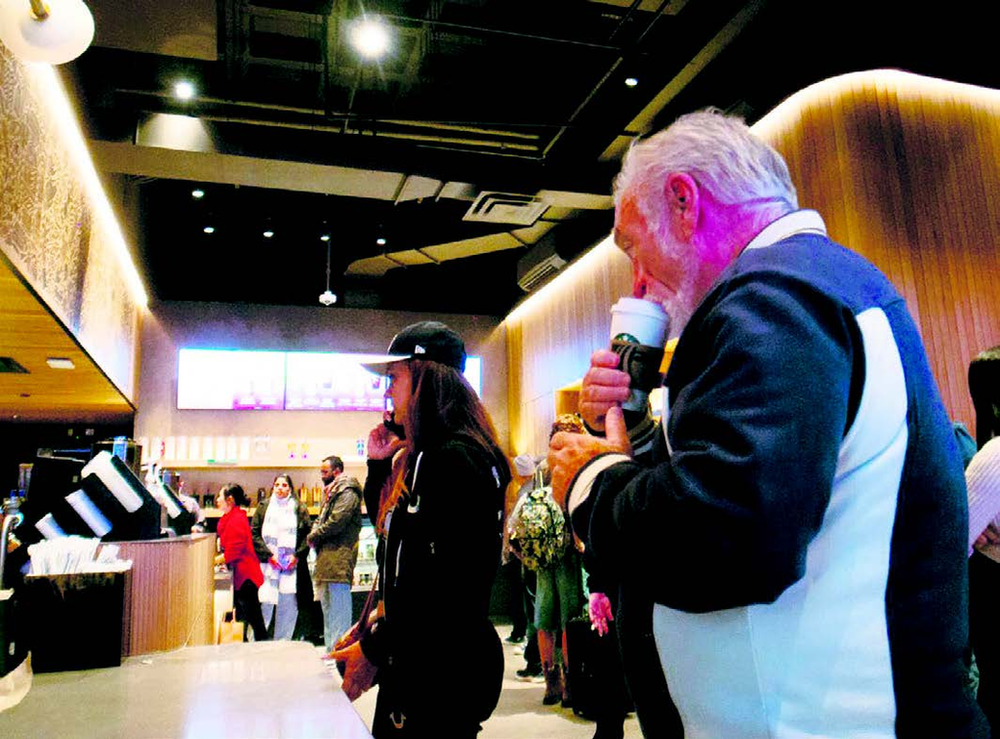
By Julie Creswell
For over three decades, Greg Tutunjian, aged 73, has been stopping by Starbucks for his coffee fix. Although he favors the dark-roast Red Eye, he’s beginning to have doubts about his allegiance to the company that serves it.
As he waits for his beverage, Tutunjian observes with annoyance as baristas prepare Iced Brown Sugar Oatmilk Shaken Espressos and other frothy, iced, caramel-laden drinks for mobile-order and drive-thru customers. Minutes pass before he finally receives his coffee (dark roast with an espresso shot).
What frustrates Tutunjian even more is when Starbucks’s mobile app informs him that his preferred coffee beans — Komodo Dragon — are available, only to discover they are not.
“I’ll visit four or five Starbucks in my neighborhood and have the same outcome. I check the app just before I go in, and it claims they have it, but upon arrival, the staff says, ‘Oh, we don’t use or check the app,’” noted Tutunjian, a software consultant from Newton, Massachusetts. “I leave empty-handed.”
Tutunjian’s grievances are now part of Brian Niccol’s challenges.
Niccol assumed the role of CEO at Starbucks on Sept. 9 and swiftly outlined the company’s shortcomings. In his inaugural week, he criticized the in-store experience in a letter on the company’s website: “It can seem transactional, the menus can feel complicated, product quality is inconsistent, wait times are lengthy, and handoffs are chaotic.”
The statistics support his claims. Last month, the coffee behemoth released a preliminary report revealing a 7% decline in global same-store sales for the fourth quarter, coinciding with “a notable drop in traffic” across North America — down 10% from the previous year. In an indicator that it will take time for Niccol to address Starbucks’ challenges, the company suspended its financial projections for the 2025 fiscal year.
Investors tuned in last Wednesday to hear about Niccol’s initial measures to address the issues he identified. The company officially shared its fourth-quarter earnings, and expectations were high for Niccol, who was lured from a successful tenure at Chipotle with a compensation package exceeding $100 million.
“Our issues are manageable — most of what we must do is within our grasp,” Niccol informed investors during the call late Wednesday. Although efforts are already in motion regarding certain matters, he admitted that “some aspects will require time.”
Some customers, already feeling the pinch from inflation, are simply hesitant to spend on $8 lattes, while others are boycotting the brand for various reasons. Additionally, several have turned to competing coffee shops that are emerging nationwide.
Starbucks also suffers from its own success. It was the originator of the customized coffee drink, with options for customers to add an extra espresso, two pumps of sugar-free vanilla syrup, topped with matcha cream cold foam. A simple coffee cup morphed into a representation of individual expression or caloric indulgence. However, those complex eight-ingredient beverages can take time to prepare. With over a third of recent transactions stemming from mobile applications, this can result in lengthy waits for in-person customers.
“The traditional Starbucks experience involves being greeted by name, enjoying a friendly chat with the barista, and receiving a delicious drink,” stated Ari Bray, a barista at a location near the University of Washington in Seattle, one of approximately 500 unionized stores across the country. “When there’s a 15-minute wait and no one can engage with you because they’re so overwhelmed, it’s not enjoyable for anyone.”
On Wednesday, Niccol outlined several strategies aimed at regaining customers. Beginning with the roll-out of the holiday menu in early November, Starbucks will cease charging customers extra for nondairy milk, which has become one of the most sought-after customizations. The company also announced it would not raise prices for the 2025 fiscal year.
Additionally, the company aims to ensure that customers receive their orders in four minutes or less, Niccol mentioned. Brewed coffee will now be handed to customers at the register, and they will be able to customize their own coffee—adding milk and sweeteners—at condiment stations that the company will reinstate. This should also help lighten the burden for baristas, Niccol noted.
Some customers reminisce about the 1990s when Starbucks cafes encouraged relaxation with a cozy chair and good conversation over lattes. Like many other dining chains post-pandemic, Starbucks has placed significant emphasis on drive-thru and pickup orders, with seating reduced or eliminated in some locations.
“My first date was at a Starbucks. One of my fondest memories is getting coffee and reading a book there,” shared Nicole Simone, a 39-year-old musician from Los Angeles. “Now it resembles a fast-food place. It has the sterile feel of a Taco Bell or McDonald’s.”
Niccol stated that the company is reevaluating and redesigning its store layout with the intention of restoring the cafe vibe and providing more comfortable seating.
Analysts anticipate that Niccol will prioritize addressing the concerns facing North American stores, which constitute nearly 43% of the company’s almost 40,000 establishments globally, generating about three-quarters of its revenue.
However, China, where Starbucks operates over 7,300 stores and has aggressive expansion plans, poses a significant challenge for the brand. Same-store sales in China dropped by 14% in the fourth quarter, as per preliminary earnings. The sluggish Chinese economy, coupled with intensifying competition from other coffee and tea retailers in the region, has led some analysts to speculate whether Starbucks might decelerate its expansion initiatives or even divest its China operations.
Nevertheless, in a video released last week, Niccol emphasized the importance of “addressing staffing in our stores, eliminating bottlenecks, and simplifying processes for our baristas.” He also stressed enhancing the mobile ordering and payment system, ensuring that mobile orders do not overwhelm the cafes.
Moreover, Niccol is swiftly working to streamline the menu, even removing the olive oil beverages previously promoted by the company’s former leader, Howard Schultz, according to Bloomberg News.
